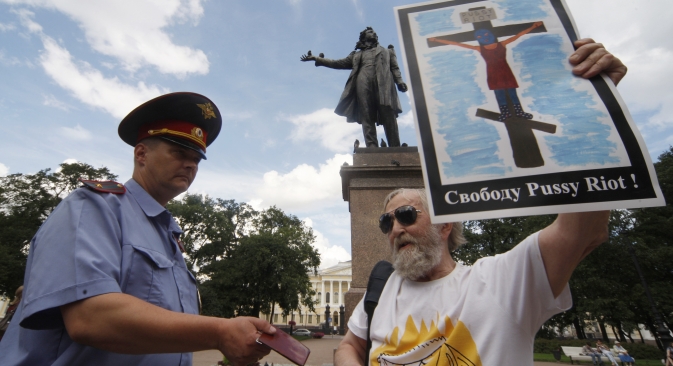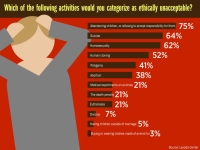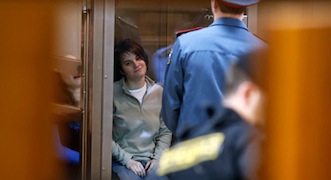New law protecting religious feelings divides Russians

A police officer checks documents of participant in a rally in support of punk group Pussy Riot on Arts Square in St. Petersburg. Source: RIA Novosti / Vadim Zhernov
The law on protecting the religious feelings of Russian citizens against insults or malicious acts – the idea for which appeared shortly after the group Pussy Riot performed their “Punk Prayer” at the Christ the Savior Cathedral in Moscow – will come into force on July 1. Violation of the law could land a person in jail for up to three years
The new amendment to the Criminal Code of the Russian Federation states that "actions in public, demonstrating clear disrespect for society and committed with the intent to insult the religious feelings of believers," will be subject to fines of up to 300,000 rubles ($9,300), or prison sentences of up to one year.
If such actions are committed “in a specially designated place of worship,” then the maximum fine is 500,000 rubles ($15,400), or three years in prison.
The article "On the Protection of the Religious Feelings of the Citizens of Russia" was previously part of the Administrative Code and had carried a penalty of up to 1,000 rubles ($30).
“We had no problem with the wording of the new law,” says Mikhail Fedotov, head of the Presidential Council for Civil Society and Human Rights.
The original bill, put forward in September 2012, called for a maximum prison sentence of five years, as opposed to three. The phrase “insulting religious beliefs and feelings” has also since been revised, becoming “actions in public... with the intent to insult the religious feelings of believers.”
Fedotov stresses that it was not enough to simply insult religious feelings.
“It has to be proven – and there’s still the presumption of innocence here – that there was deliberate intent to insult religious feelings,” he said.
Simply saying “God doesn’t exist,” for example, is not punishable under the law.
“If you go to a church with a sign saying ‘God doesn’t exist,’ or if you start chanting it in a church – especially during a service – then this is in clear violation of the law,” explains Fedotov.
Fedotov points out that the new law also protects atheists.
"Members of religious faiths and atheists are both believers – the first group believes in the existence of God, while the second group believes otherwise," he said.
At the same time, the Council for Civil Society and Human Rights fought – unsuccessfully – to have a clause inserted into the law stating that complaints could only be filed by the injured party. Under the current wording, charges can be brought against an individual on the basis of police reports of a given incident.
Henri Reznik, president of the Moscow Chamber of Advocates, points out that the new law is simply a rehashing of existing terminology in Russian law.
The Criminal Code already contains articles covering the incitement of religious hatred, as well as the humiliation of honor and dignity on religious grounds. To date, not a single person has been charged with Insulting Religious Feelings — an article that has been in the Administrative Code of the Russian Federation for over 10 years.
“The 10-year period during which this particular article has remained untouched goes to show how difficult it is to prove that such actions have actually been committed,” Reznik says.
From a legal perspective, he believes, the very concept of “insulting religious feelings” is open to interpretation, which paves the way for abuses of power to take place.
“How can you define the words ‘insult’ and ‘feelings’?” says Reznik. “We can be insulted by any number of things. We have moral feelings and we have feelings of what we think is right. The laws that are being passed right now in the Russian Federation are an insult to my juridical feelings, for example.”
“We’re going to have to wait and see what happens when it comes time to actually apply the law,” Mikhail Barshchevsky, Russian government representative in the high courts, said in an interview with the Ekho Moskvy radio station on June 11. He pointed out that, when the equally high-profile law on extremism was passed, “we were all worried it was worded so loosely that just about anything could be seen as extremism.”
“So far, and with very few exceptions, ordinary, law-abiding citizens have not been affected by the law on extremism,” said Barshchevsky.
At the same time, he added that he was “very concerned about the second part [of the new law] – the part about actions committed inside a church.”
“If that’s what it says in the second part of the new law, then the first part refers to actions committed in places that are not religious – that is, anywhere – in public, in a lift, in your own home, on the radio,” said the representative.
“The government should pass laws in a balanced way. But, to be honest, there’s always going to be bias in favor to the Russian Orthodox Church here,” says Alexander Shatilov, dean of the department of sociology and political science at the Financial University of the Government of the Russian Federation.
Related:
Authorities to punish sacrilegious acts with a jail sentence
According to Shatilov, left-wing media are engaged in a campaign against the Russian Orthodox Church and Patriarch Kirill, who are “clearly acting on the side of the ruling party and causing discontent among the opposition.”
“Insulting people based on their religious beliefs, and the desecration of their venerated objects, has always been considered unacceptable. But punishment for such offences is now far more severe. And I hope this will help prevent the desecration of religious symbols and put an end to religious harassment in the future,” RIA Novosti quoted the head of the Russian Orthodox Church’s Department for the Cooperation of Church and Society, Vsevolod Chaplin, as saying.
The deputy chairman of the Russia Mufties Council, Rushan Abbyasov, also welcomes the newly adopted law. “This law may help to cool a lot of hot heads and prevent many actions aimed at inciting ethnic and religious hatred,” he said.
All rights reserved by Rossiyskaya Gazeta.
Subscribe
to our newsletter!
Get the week's best stories straight to your inbox


